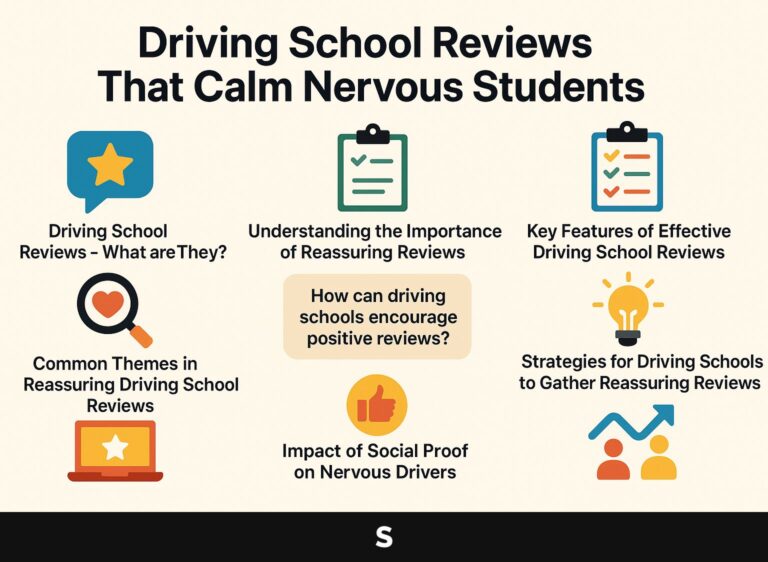Pet Store Reviews That Show Care for Animals
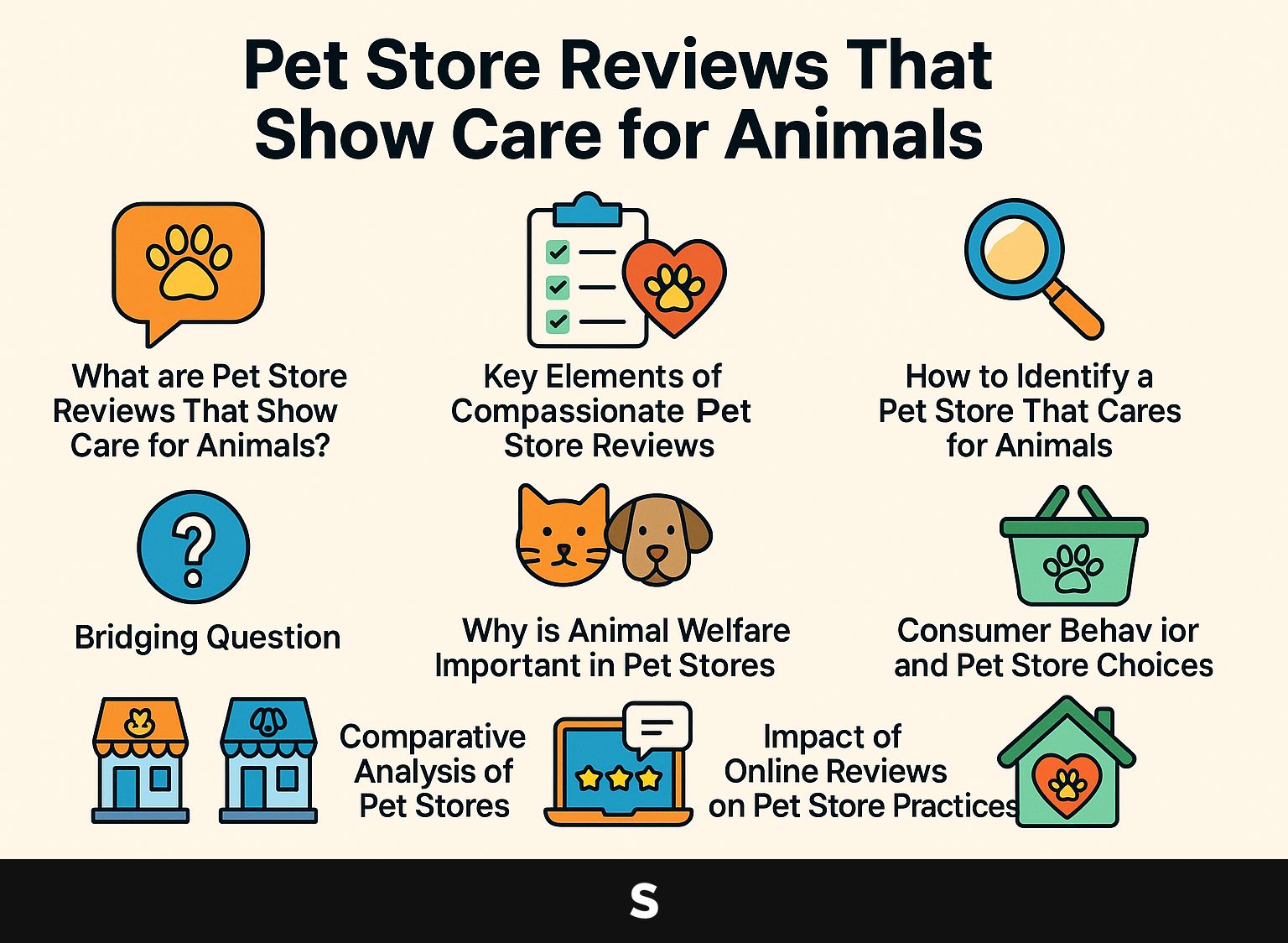
In your search for the best pet stores, finding a place that genuinely cares for animals can be challenging. Unlike businesses that just sell pets, caring stores like Worldwide Puppies and Kittens focus on getting animals responsibly and providing helpful services.
Our reviews focus on places that offer good pet care products and help families choose suitable pets for their kids. Learn how these stores, often supported by good reviews on platforms like Chewy.com, make sure your new pet is healthy, content, and cared for.
Key Takeaways:
- Choose a pet store that prioritizes ethical sourcing of animals and has transparent health records and breed information.
- Look for staff knowledge and training about animal care, as well as follow-up support and resources for pet owners.
- Support a pet store that partners with local rescues and is actively involved in the community, as they truly care for animals.
- What are Pet Store Reviews That Show Care for Animals?
- Key Elements of Compassionate Pet Store Reviews
- How to Identify a Pet Store That Cares for Animals
- Why is Animal Welfare Important in Pet Stores?
- Consumer Behavior and Pet Store Choices
- Comparative Analysis of Pet Stores
- Impact of Online Reviews on Pet Store Practices
- Local Rescues: How They Work With Pet Stores
- Upcoming Changes in Pet Store Care Practices
- Frequently Asked Questions
- 1. What makes a pet store review show care for animals?
- 2. How can I tell if a pet store truly cares for animals?
- 3. Why is it important to support a pet store that loves animals?
- 4. How does a pet store’s partnership with local rescues show their care for animals?
- 5. What are some ways that a pet store can show care for animals?
- 6. Why should I consider adopting from a pet store that truly loves animals?
What are Pet Store Reviews That Show Care for Animals?
Pet store reviews that truly care about animals often provide details about the store’s commitment to getting animals ethically and caring for them properly. This makes them stand out from regular reviews that might overlook these factors.
1. How do these reviews differ from standard pet store reviews?
Unlike standard pet store reviews, those highlighting care for animals often discuss ethical sourcing practices and the store’s engagement with local rescues, showcasing a deeper commitment to animal welfare.
These reviews typically include specific examples, such as the store’s partnerships with local shelters or their volunteer initiatives.
For instance, a store that participates in community adoption events demonstrates a proactive approach to animal welfare. Compassionate reviews often mention the quality of products, focusing on natural, chemical-free options sourced from suppliers who prioritize humane treatment.
Tools like Spokk.io can help identify such stores by aggregating user testimonials and highlighting their community impact, guiding consumers toward ethical choices.
2. What criteria are used to evaluate care for animals?
Important factors to consider when assessing how well a pet store looks after animals include clear access to health records, knowledgeable staff, and support for new pet owners after purchase.
A store that provides clear health records demonstrates commitment to animal welfare, allowing potential adopters to assess any medical needs.
Knowledgeable staff should answer questions and provide training materials for new pet owners to encourage responsible pet care.
Follow-up help, like regular updates or more training sessions, helps the adopting family be ready for a smooth change. Together, these parts improve the adoption process and help create a stronger bond between pets and their owners.
Key Elements of Compassionate Pet Store Reviews
Reviews of caring pet stores should consider key factors that show a store’s true dedication to the well-being of animals, such as responsible sourcing and employee education.
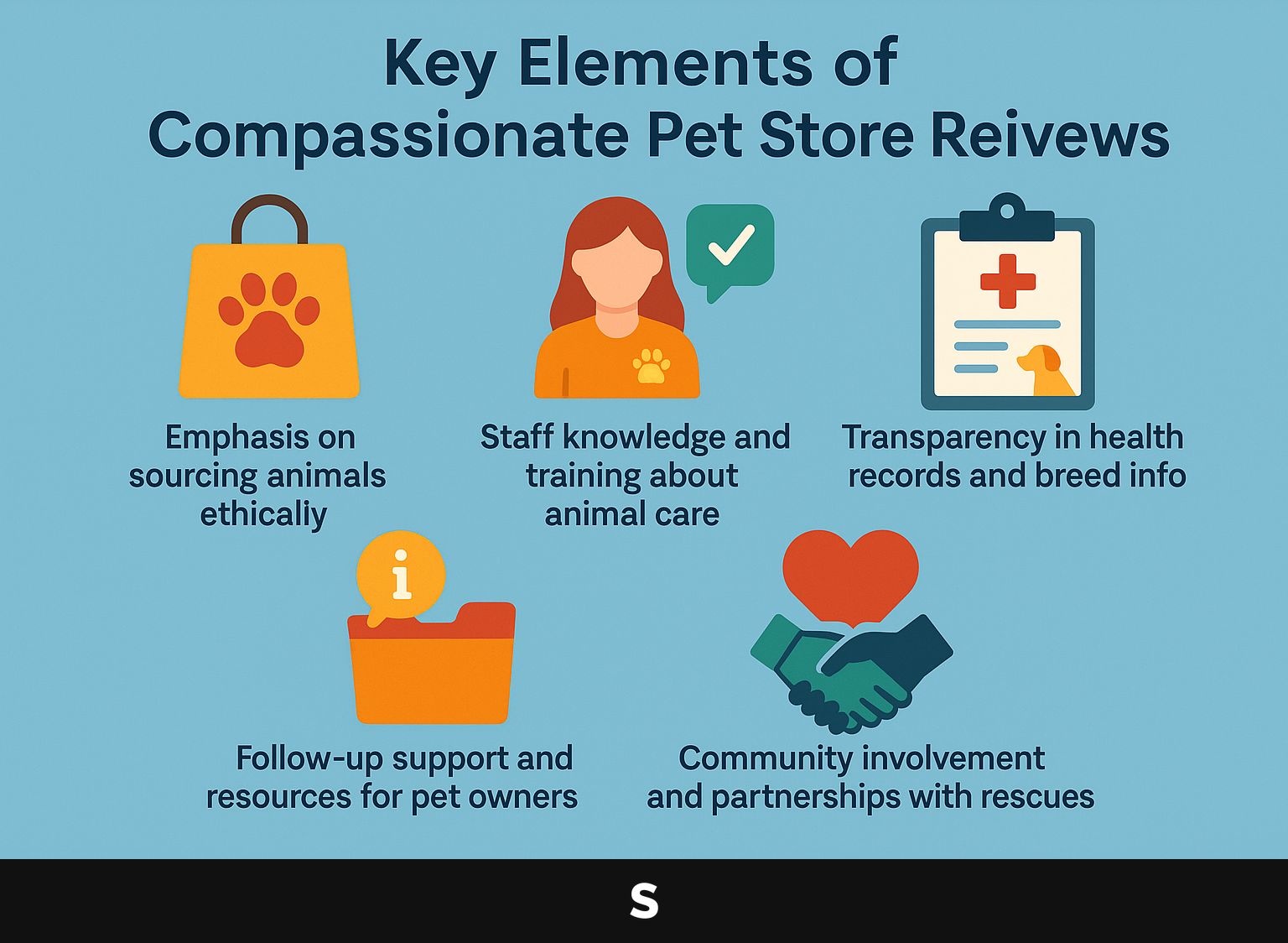
1. Emphasis on sourcing animals ethically
Compassionate reviews highlight the importance of sourcing animals from reputable breeders or local rescues, thereby ensuring ethical treatment and good health.
Choosing to get a pet from local shelters gives a home to animals who need one and backs responsible methods. For instance, groups like PetSmart Charities team up with local shelters to hold events where people can adopt pets, reaching many more potential pet owners.
Statistics indicate that adopting rather than buying can save thousands of lives each year; for example, in 2022, over 1.6 million pets were adopted through such initiatives.
By patronizing these stores, you contribute to animal welfare and encourage responsible breeding practices.
2. Staff knowledge and training about animal care
Knowledgeable staff who are well-trained in animal care can significantly improve the quality of service and support provided to pet owners, as reflected in compassionate reviews.
For optimal customer experience, look for stores where staff have completed certifications like the Pet Tech CPR and First Aid program or the National Association of Professional Pet Sitters training. These programs equip employees with hands-on skills for pet emergencies and proper handling techniques.
When you visit, see how employees handle questions and offer specific advice for various pet requirements. A trained team makes your shopping better and helps keep your pets healthy.
3. Follow-up support and resources for pet owners
People often praise pet stores that provide extra help and guidance, like training advice and health information, to help pet owners succeed.
Many stores offer free training classes and health checklists when you adopt a pet. PetSmart offers various training classes and an online collection of videos and articles.
Customers rave about how this support helps them bond better with their new pets. A customer said, “The puppy training class we attended at PetSmart was really useful; our dog is now well-behaved and content!” This type of follow-up improves the owner’s experience and builds a community where pet care knowledge grows.
4. Transparency in health records and breed information
Giving clear health records and correct breed details is a key feature of caring pet stores. This honest approach helps pet owners make confident choices. To make information clearer, many pet stores show health records in the store and can provide digital copies if asked.
For instance, reputable stores may partner with veterinary clinics to provide up-to-date vaccination status and background health information.
Staff can be trained to explain records in layman’s terms, ensuring pet owners fully understand the documents. Utilizing customer-friendly technology, like mobile apps that allow pet owners to access their pet’s health information anytime, can further build trust and assurance in the care their pets receive.
5. Community involvement and partnerships with rescues
Reviews often highlight stores that actively engage with the community and partner with local rescues, showcasing their commitment to broader animal welfare initiatives.
These stores frequently hold events where animals can find new homes, giving important opportunities to animals that need them. PetSmart frequently collaborates with nearby shelters to organize monthly events, allowing people to meet and adopt adorable pets.
Retailers like Petco focus on educational programs, offering workshops on responsible pet ownership and training techniques. This increases community awareness and helps local rescue groups by building a more informed pet community, which leads to fewer animals in shelters.
How to Identify a Pet Store That Cares for Animals
Finding a pet store that genuinely cares for animals means looking for clear signs that they focus on animal welfare and treat animals ethically.
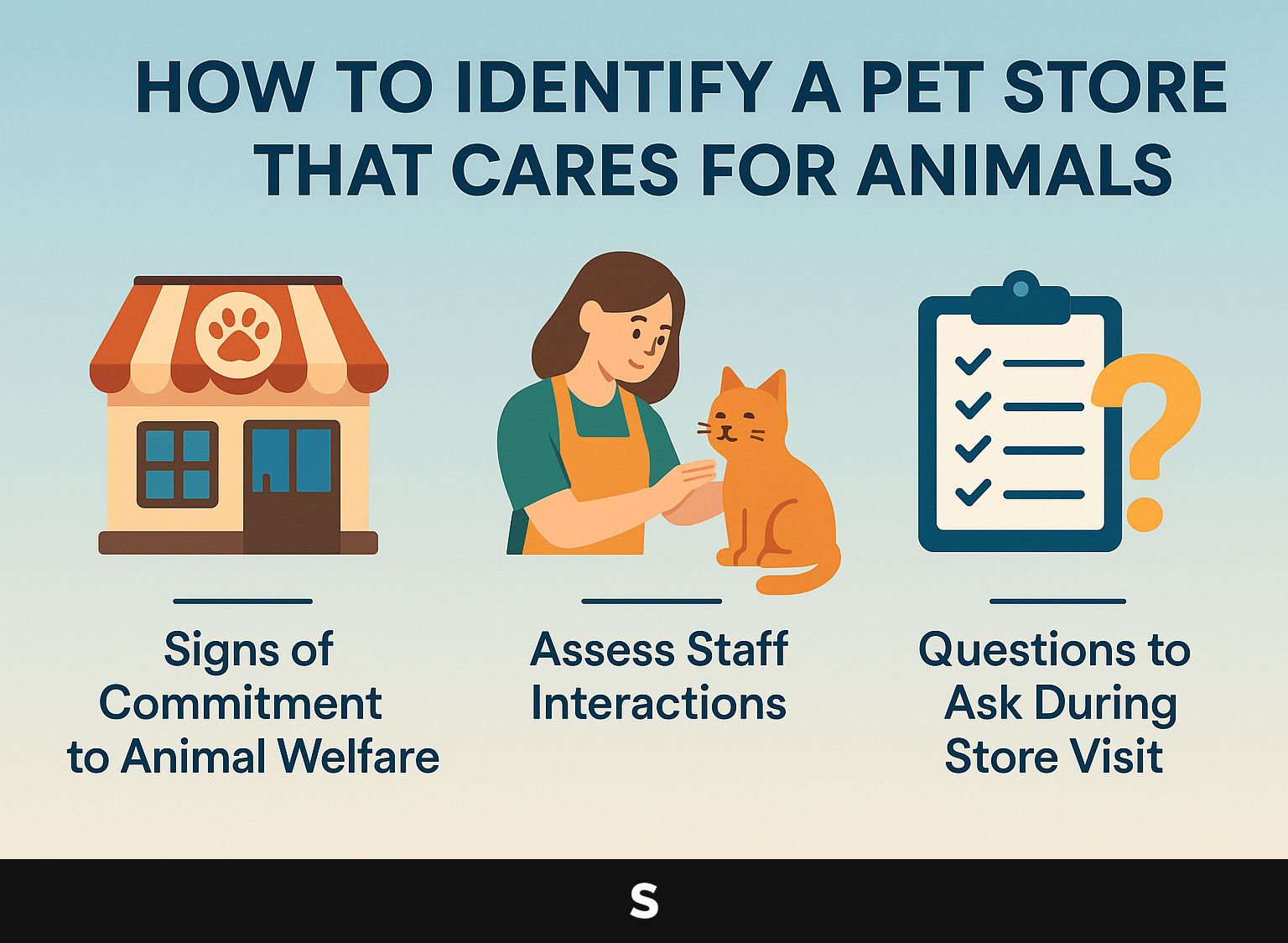
1. What signs indicate a store’s commitment to animal welfare?
Signs of a pet store’s commitment to animal welfare include visible cleanliness, well-cared-for animals, and staff engagement with pets and customers.
Look for certifications displayed prominently, such as those from the Humane Society or other animal welfare organizations.
Check the animal enclosures; they should be large, tidy, and offer enough activities for the animals. Friendly, knowledgeable staff who are willing to answer questions and discuss care routines demonstrate a dedication to animal welfare.
If employees are seen interacting joyfully with the pets, it indicates a healthy environment where animals are truly valued.
2. How to assess staff interactions with animals?
Observing how employees interact with animals can indicate the store’s commitment to animal welfare and the quality of their pet care. Observe how staff handle animals during customer interactions. Are they gentle and patient?
Look for staff members who exhibit knowledge about the animal’s needs, such as discussing specific care requirements. Ask questions like, “What do you know about this breed’s temperament?” or “How do you handle anxious pets?”
A knowledgeable employee should offer clear advice on training or socialization techniques. This shows they know what they’re doing and highlights the store’s commitment to responsible pet care.
3. What questions to ask during a store visit?
Asking the right questions during a store visit can help consumers gauge a store’s commitment to animal welfare and ethical practices.
- Key questions to consider includeWhere do you source your animals?” This helps determine if the store collaborates with responsible breeders or rescues.
- Inquire about health records to understand how they manage animal health and wellness.
- It’s important to ask if the staff is trained in caring for animals and welfare practices. They should know how products are sourced and how animals are treated.
These questions give information and also show the store that consumers care about ethical standards.
When looking through pet stores, knowing how to recognize their dedication to animal welfare is important for those considering getting a pet.
Why does this matter? Purchasing pets or supplies from stores that prioritize animal welfare can significantly impact both the pets’ wellbeing and the community.
Look for indicators such as certifications from organizations like the American Humane Association or visibility into their sourcing practices.
Questions to ask include:
- Where do the animals come from?
- Are they raised in humane conditions?
- Are there testimonies from previous clients highlighting both care and ethics?
Answering these questions helps people make informed decisions that support animal well-being.
Why is Animal Welfare Important in Pet Stores?
Looking after animals in pet stores is crucial because it influences their health and behavior. It also shapes how the community views and handles owning pets.
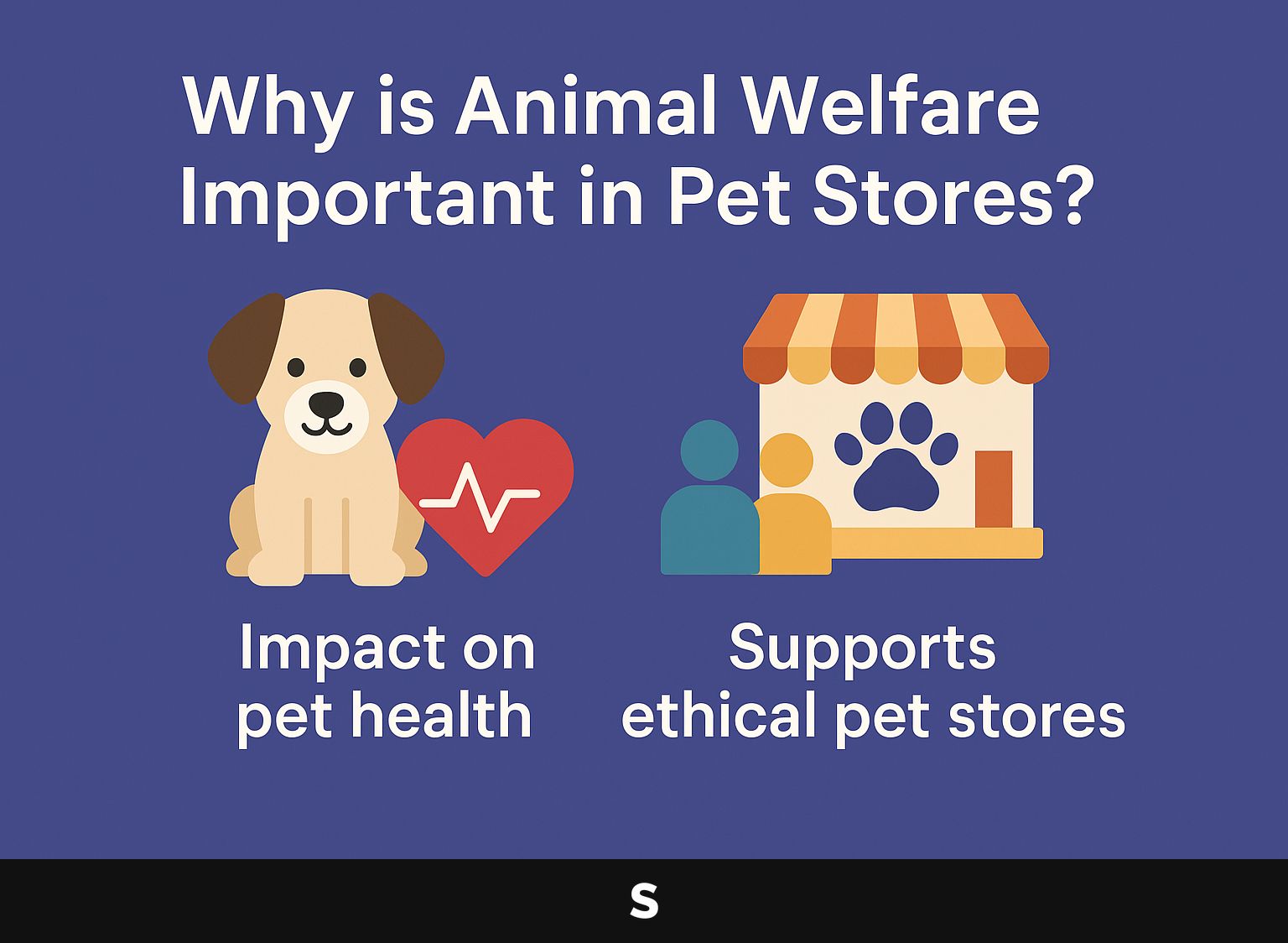
1. What impact does animal welfare have on pet health?
Prioritizing animal welfare in pet stores leads to better health outcomes for pets, as evidenced by well-maintained health records and socialization practices.
Shops like PetSmart and Pets at Home make sure animals have plenty of room and get along with each other. These practices contribute to reduced stress levels, which in turn lowers the incidence of common health issues like respiratory infections.
These retailers often implement regular veterinary check-ups and properly manage nutrition, evident in healthier animals ready for adoption. For instance, a study found that pets from stores prioritizing welfare had a 30% lower rate of illness during their first year in a new home compared to those from less attentive environments.
2. How does supporting ethical pet stores affect the community?
Backing ethical pet stores helps create a healthier community by encouraging responsible pet care and decreasing the number of puppy mills.
When people shop at ethical stores, they support local businesses and help improve community well-being. For example, research showed that spending a dollar at a neighborhood pet shop brings in around $1.70 for the community, while spending the same amount at big chains adds just $0.43.
Ethical stores often partner with local rescue organizations, helping to find homes for abandoned animals. Adopting pets from these stores also raises awareness about animal welfare issues. Communities gain from fewer crowded shelters and a greater dedication to caring for pets kindly, which results in improved conditions for both animals and people living there.
Consumer Behavior and Pet Store Choices
Customer behavior is important in deciding which pet store to choose, especially through reviews and personal suggestions.
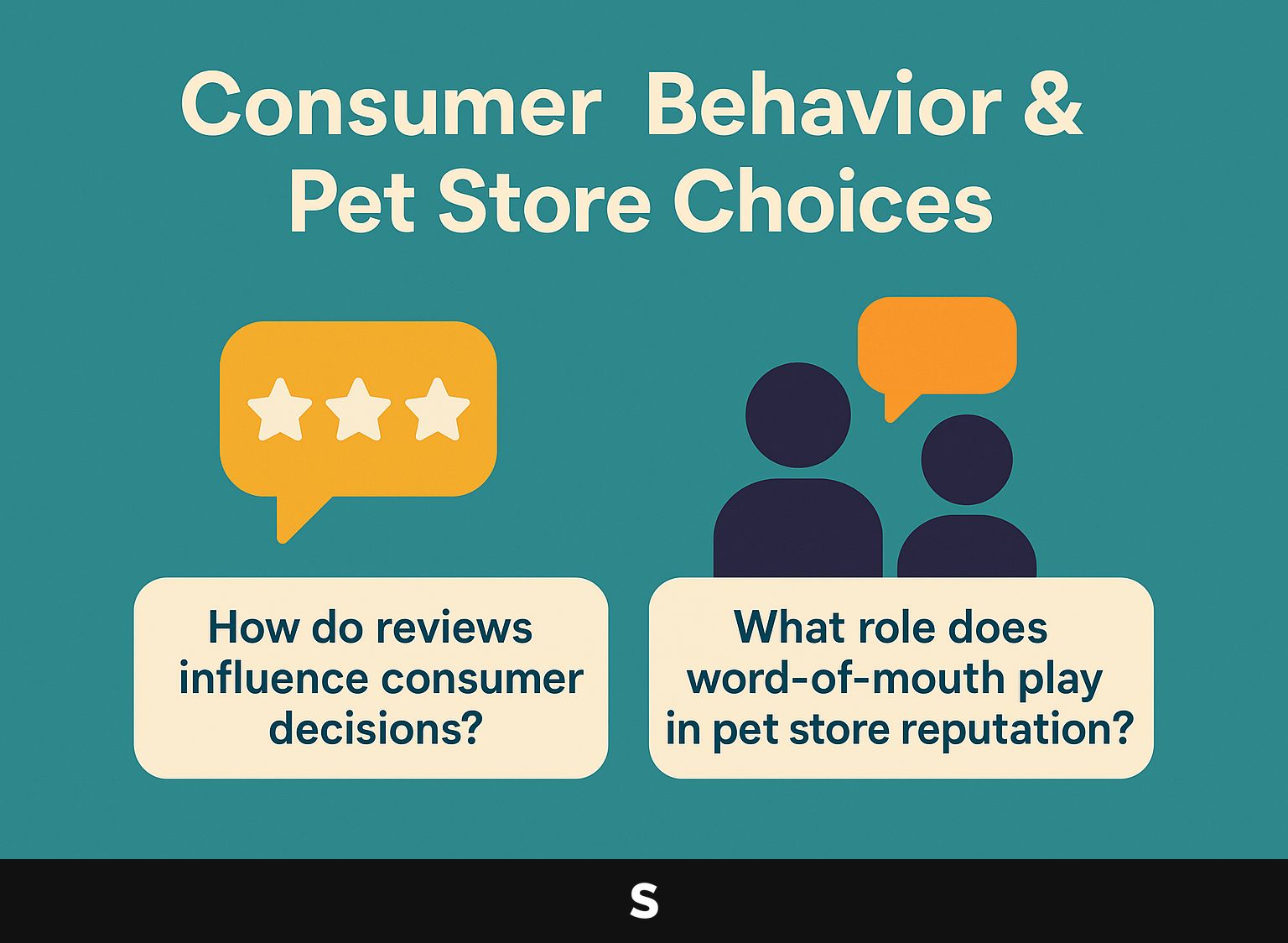
1. How do reviews influence consumer decisions?
Reviews significantly influence consumer decisions, often serving as the deciding factor when choosing a pet store based on their commitment to animal welfare.
A 2021 study found that 79% of consumers trust online reviews as much as personal recommendations. Pet stores that actively engage in transparent review management see sales increase by an average of 18%. Showing customer reviews on social media can improve trust and help bring in more clients.
Tools like Trustpilot or Google Reviews allow businesses to gather and showcase feedback effectively. Responding to both positive and negative reviews demonstrates commitment to customer satisfaction, further enhancing brand loyalty.
2. What role does word-of-mouth play in pet store reputation?
Word-of-mouth can strongly build or harm a pet store’s reputation, especially regarding how they take care of animals.
Good reviews can make a pet store a local favorite. For example, a store that actively participates in animal welfare initiatives-like adopting out rescue pets or hosting adoption events-often sees increased foot traffic and sales.
Conversely, a store criticized for poor animal care may face backlash, impacting both sales and customer trust. Tools such as social media monitoring platforms can help store owners track community sentiment. Talking openly with customers and quickly dealing with their issues can greatly reduce negative views.
Comparative Analysis of Pet Stores
Comparing ethical pet stores to bad options, like puppy mills, shows big differences in how animals are treated and the customer experience.
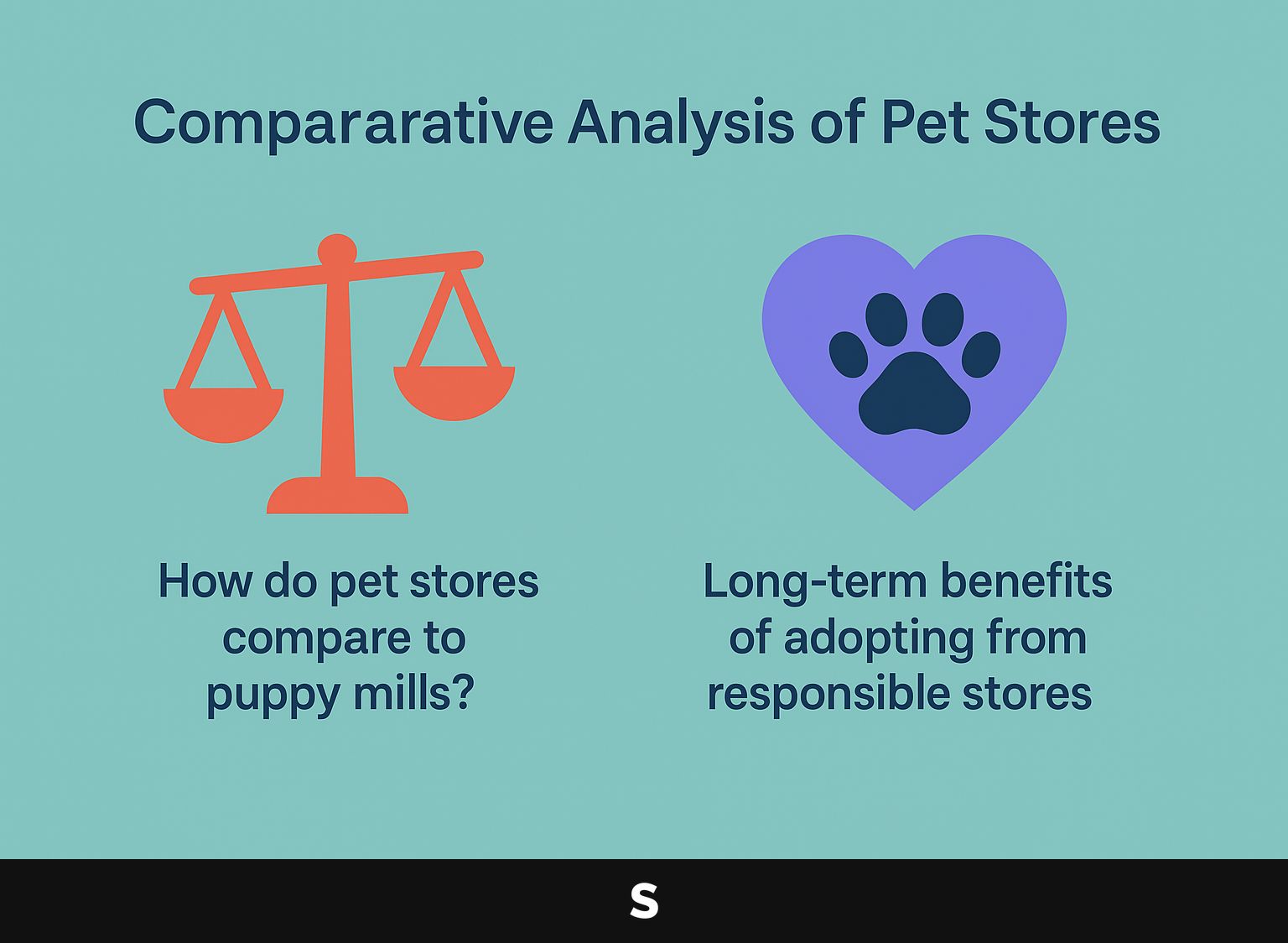
1. How do ethical pet stores compare to puppy mills?
Ethical pet stores prioritize animal welfare by collaborating with local rescues, unlike puppy mills that often engage in unethical breeding practices.
These ethical stores offer a safe place for animals and have clear adoption processes. For instance, many ethical shops require potential adopters to fill out applications, meet adoption criteria, and undergo home checks.
In contrast, puppy mills typically operate with minimal oversight, leading to poor health outcomes for the animals. By supporting stores that work with rescues, customers help promote kind treatment and get pets that are usually healthy, have their vaccinations, and are well socialized.
This method encourages community involvement and supports the long-term care of pets.
2. What are the long-term benefits of adopting from responsible stores?
Adopting from responsible stores leads to long-term benefits for both pets and owners, including improved health and behavioral outcomes.
Research indicates that pets adopted from ethical sources tend to exhibit fewer behavioral issues. For instance, a study found that shelter dogs showed a 70% reduction in aggression when provided with consistent training and a loving environment.
Responsible breeders often screen for genetic health issues, leading to lower vet bills over time. People who adopt pets often feel happier, with many saying their happiness improves by 40% after bringing a pet home.
Choosing well for your pet helps them stay healthy and happy, benefiting both you and your pet.
Impact of Online Reviews on Pet Store Practices
Reviews from the internet significantly affect how pet stores operate. They often lead to better customer service and improved rules for animal care.
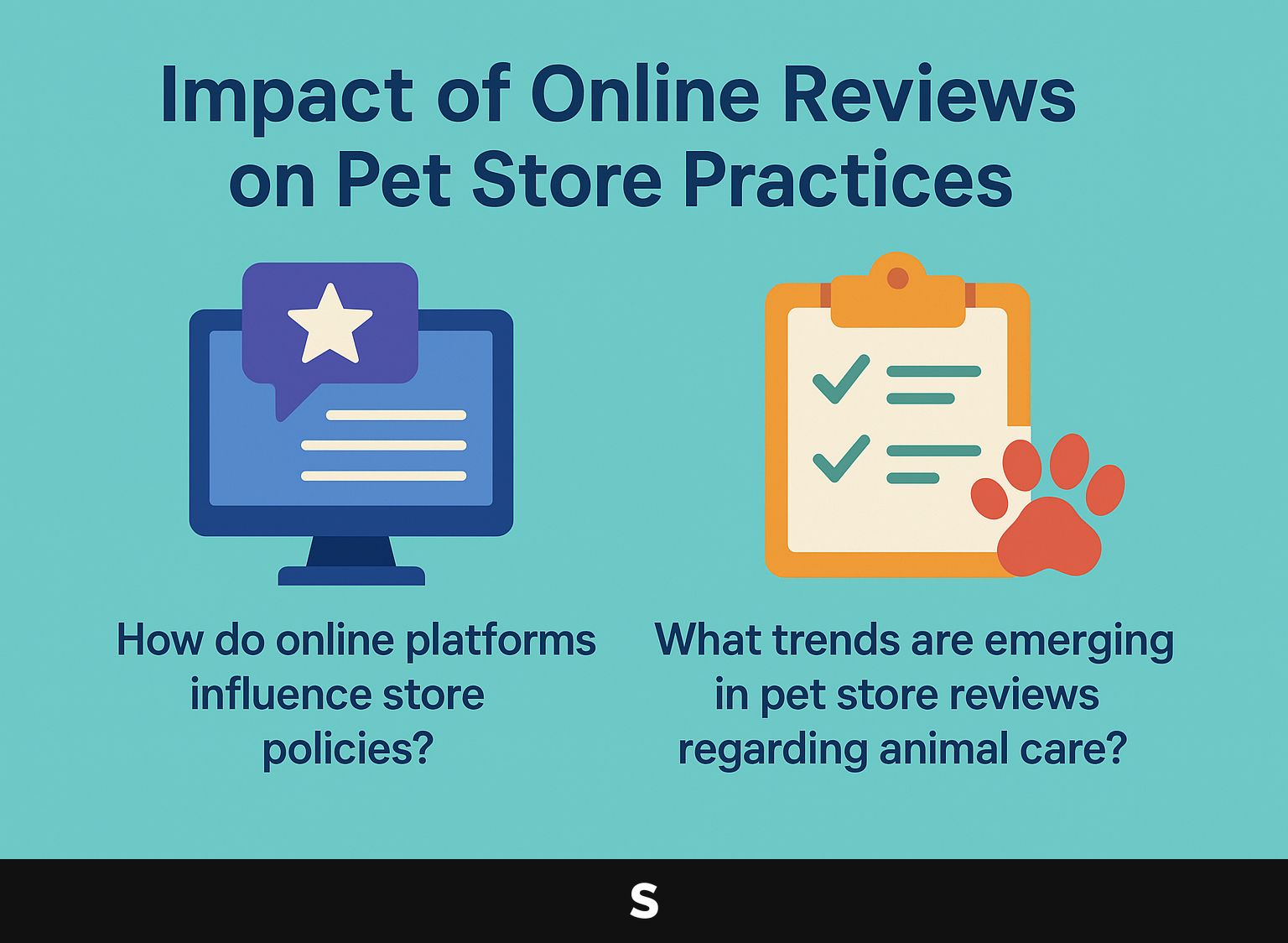
1. How do online platforms influence store policies?
Pet stores are changing their policies based on feedback from online platforms to meet customer expectations for the care of animals.
PetSmart has updated its policy on returning pet items because customers felt the previous rules were too harsh. Acknowledging concerns about product safety and customer satisfaction, they expanded return windows for opened items.
Similarly, Petco introduced a new health guarantee for adopted pets, inspired by reviews highlighting the need for better post-adoption support. These changes address customer feedback and build loyalty, showing how important it is to keep track of online reviews when planning business strategies.
2. What trends are emerging in pet store reviews regarding animal care?
Emerging trends in pet store reviews reflect a growing consumer focus on ethical treatment, with increased scrutiny on sourcing practices and animal health.
This shift is evident in the rise of consumer demand for transparency in supply chains. For example, brands like Petco and Chewy now emphasize their work with well-known breeders and suppliers.
Stores are now more frequently installing ‘animal wellness’ certification programs to validate their practices. As pet owners become more conscious of issues like sustainability and humane treatment, successful marketing strategies focus on these ethical commitments.
Stores that promote biodegradable products or adopt farm-to-shelter initiatives are likely to win consumer loyalty, impacting their sales positively.
Local Rescues: How They Work With Pet Stores
Local rescues are important for improving what pet stores offer. They provide a regular supply of healthy animals and encourage responsible adoption practices.
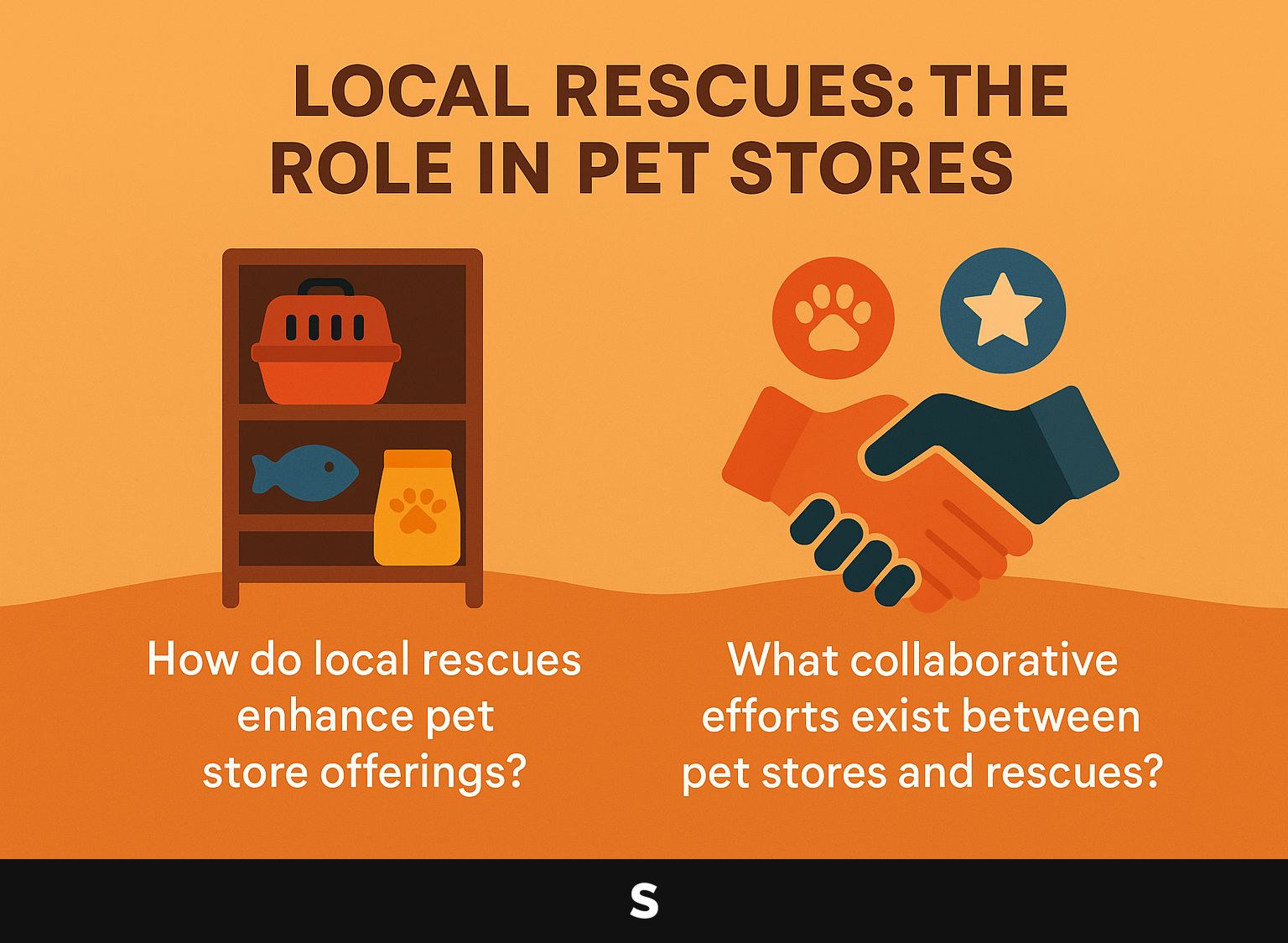
1. How do local rescues improve pet store options?
Local animal shelters help pet stores by providing a range of pets that can be adopted and making sure they are healthy before being placed for adoption.
Partnering with local rescues, such as the Paws & Claws Rescue or the Hope Animal Shelter, helps pet stores present a broader variety of animals, from common breeds to rare mixes. These organizations make sure pets get their shots and are fixed before they are moved, which greatly benefits their health and chances of being adopted.
By holding events where people can adopt pets and offering workshops with these rescues, pet stores increase customer involvement and build a community that understands responsible pet care. This partnership model often leads to higher adoption rates and better care standards for all pets involved.
2. What collaborative efforts exist between pet stores and rescues?
Many pet stores engage in collaborative efforts with local rescues, including hosting adoption drives and educational events to promote animal welfare.
One successful initiative involved a pet store partnering with a local rescue to host a monthly ‘Adopt-a-Pet’ event. This partnership showcased rescue animals and provided the store with an opportunity to educate customers on proper pet care.
Social media campaigns can spread these events to more people. For example, using Facebook Events to promote the adoption days can greatly increase attendance, while Instagram posts showing adoptable pets can encourage sales that help both the store and the rescue.
Upcoming Changes in Pet Store Care Practices
Upcoming changes in pet store care are moving more towards using technology and paying more attention to the well-being of animals and teaching customers.
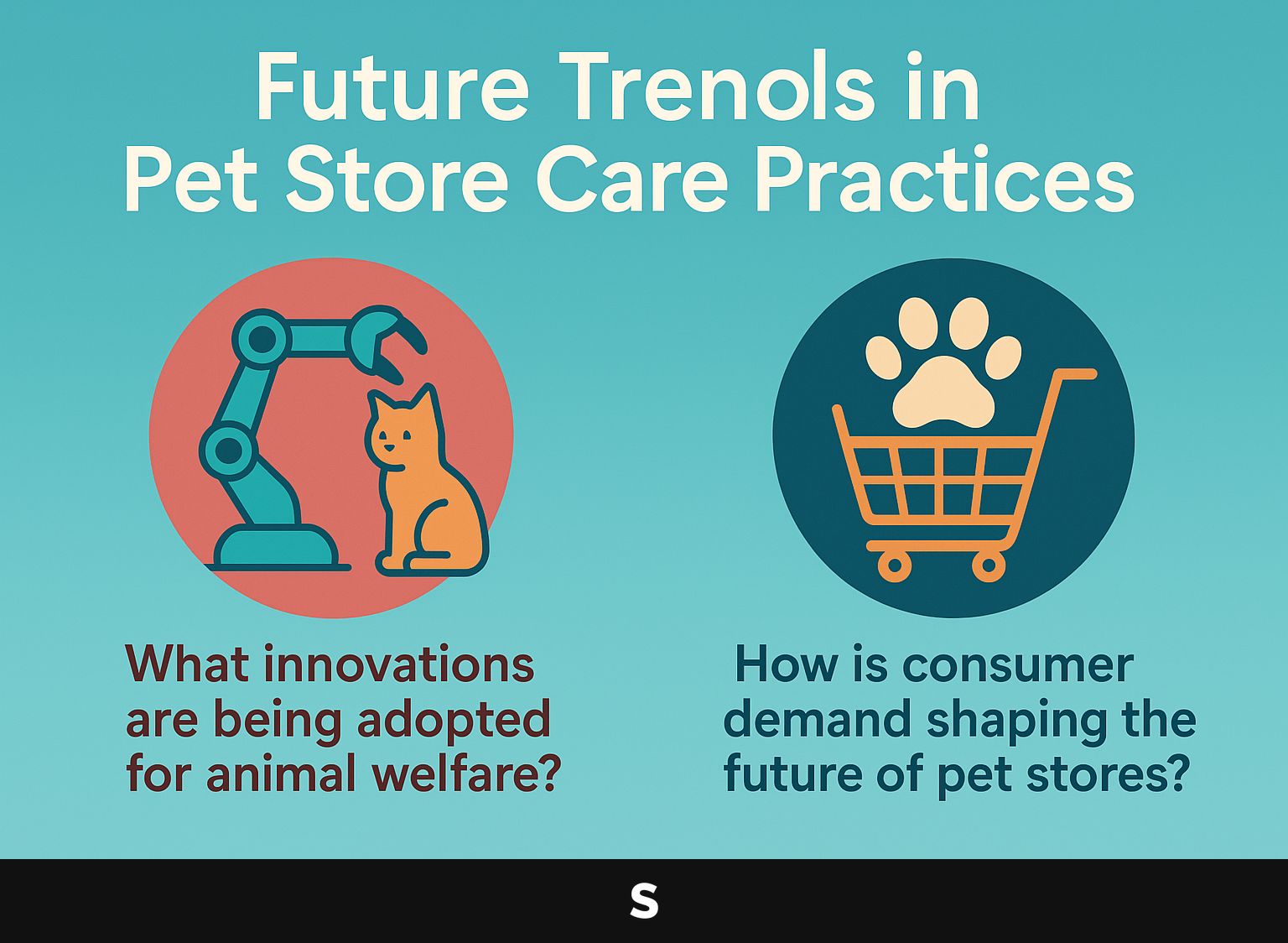
1. What innovations are being adopted for animal welfare?
Pet stores are using new technologies like health record tracking systems and interactive pet care apps to improve the well-being of animals.
For example, stores like PetSmart offer online tools that allow pet owners to monitor vaccination schedules and health records through apps such as Pawtrack.
These tools improve communication between pet owners and staff and make care routines more efficient. Systems like Petnet allow people to control when their pets eat using their phones, which can help stop pets from eating too much and support their health.
Such technologies have led to increased customer satisfaction and repeat visits, as owners feel more connected to their pets’ care.
2. How is consumer demand influencing what pet stores will look like in the coming years?
Consumer demand is increasingly driving pet stores to adopt ethical practices and improve transparency in their operations.
A recent survey showed that 72% of pet owners prioritize sourcing when choosing where to shop. As a result, many pet stores are now displaying sourcing certifications prominently, showcasing partnerships with local farmers or ethical breeders.
For instance, stores may offer products sourced from suppliers who adhere to humane animal treatment standards. More retailers are investing in technology to track the supply chain, ensuring that customers can easily access information about the origins of their pet products.
This change increases trust and meets the increasing consumer demand for ethical shopping.
Frequently Asked Questions
1. What makes a pet store review show care for animals?
A pet store review that shows care for animals is one that highlights the store’s commitment to the welfare and well-being of their animals, through their actions and services.
2. How can I tell if a pet store truly cares for animals?
You can tell if a pet store truly cares for animals by looking for signs such as partnering with local rescues, providing health records, training tips, and follow-up calls, and ensuring their animals are healthy and well-socialized.
3. Why is it important to support a pet store that loves animals?
Supporting a pet store that truly loves animals means that you are contributing to a business that prioritizes the welfare of its animals, and in turn, supporting the welfare of animals in general.
4. How does a pet store’s partnership with local rescues show their care for animals?
A pet store’s partnership with local rescues shows their care for animals by helping to find homes for rescued animals, rather than supporting puppy mills, which prioritize profit over the well-being of animals.
5. What are some ways that a pet store can show care for animals?
A pet store can show care for animals by providing proper health and socialization practices, partnering with rescues, and offering resources such as training tips and follow-up support for their animals and customers.
6. Why should I consider adopting from a pet store that truly loves animals?
By choosing to adopt from a pet store that genuinely cares for animals, you provide a home to an animal in need and support a store that focuses on animal care and their welfare.




